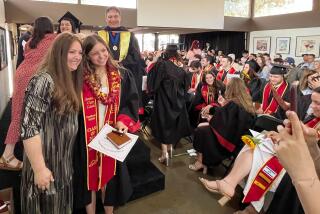Colleges, Like, Focus on Speech
NORTHAMPTON, Mass. — Not long ago, Smith College English professor Patricia Skarda was walking behind two students deep in conversation. A strict grammatical constructionist, Skarda took note of their syntax.
“One used ‘like’ 48 times,” she reported, “the other, 37.”
Skarda was appalled but not shocked. After all, the insidious proliferation of the youthful sub-dialect known as Mallspeak--also unlovingly called, in some quarters, Teenbonics--was part of the reason Smith followed nearby Mount Holyoke College in instituting a sweeping new curriculum that makes speaking as important as writing.
A product of both the urban street scene and the consumer cathedrals of the San Fernando Valley, Mallspeak is the speech form that gave forth the dreaded phrase “gag me with a spoon” and made “like” the first word to be a verb, adjective, adverb and conjunction--all at once. “Minimalist,” “repetitive,” “imprecise” and “inarticulate” are some of the words Smith College President Ruth Simmons uses to describe Mallspeak, adding, “It drives me crazy.”
At the start of this academic year, Smith launched its “speaking across the curriculum” program, featuring “speaking intensive” first-year seminars taught by senior faculty members and an emphasis in many classrooms on oral presentations. At Mount Holyoke, 15 miles down the road, the Speaking, Arguing and Writing program initiated a year and a half ago as what is believed to be the country’s first combined speaking and writing program is even more extensive.
From the day they first pass through the heavy iron gates of this country’s oldest women’s college, students are assigned speaking mentors. Each class includes an oral component, and some professors have added oral exams--long the purview of doctoral candidates, not undergraduates--to their course outlines. In a special Speaking Center, students can videotape each other and are encouraged to critique their work.
At both schools, the premise is that writing skills and a degree from a prestigious institution are no longer enough. In order to face the world beyond college, students must speak effectively, be able to organize cogent arguments and be ready to function in an increasingly team-oriented workplace. It’s verbal competence-cum-confidence: understanding that Mallspeak is fine when you’re with your buddies, but beginning a meeting with “I was, like, y’know, whatever” just won’t cut it.
Mount Holyoke College President Joanne V. Creighton calls the linking of these skills with liberal arts “revolutionary” and predicts that her school’s effort will be widely emulated.
Already, that seems likely. MIT, Holy Cross College and Wesleyan College this year began focusing on speaking skills. Before launching its “speaking across the university” initiative in the fall, University of Pennsylvania officials consulted with Lee Bowie, the philosophy professor who heads Mount Holyoke’s Speaking Center. Faculty members from Stanford University also have contacted Bowie to learn about the Mount Holyoke curriculum, whose future seems guaranteed by a $4-million endowment from an alumna and her investment banker husband, Harriet and Paul Weissman of White Plains, N.Y.
The Ability to Make a Point
Bowie said the program was born out of “a concern that the fabric of public discourse has deteriorated.” Mallspeak was only one symptom, and, in truth, Bowie was not terribly worried about that. Every generation has its sub-dialect, Bowie noted, designed in part to drive adults nuts and in part to establish verbal autonomy. His own 9-year-old, Bowie said, could set up shop offering classes in Mallspeak, a language “exquisitely suited to a very narrow purpose, communicating things of importance to young people.”
Fine, said Bowie, but educators need to make sure that students know how to frame arguments and make points. This premise extends well beyond the campus, said Bowie, who worries that, “as a society, we are not very good at addressing crucial issues. We have a tendency when there are hard issues either to fight over them or to skirt around them.”
A school with just 2,000 students hardly reflects the planet at large. But it’s a start, said Bowie, a recognition that “if students have something important and interesting to say, they’re going to be able to say it well.”
Over lunch at Mount Holyoke, speaking and writing mentor Emily Stork, a sophomore from La Canada, said one challenge is that often “students want to know if they’re right or wrong” when they speak.
Or, said Carrie Alme, a sophomore speaking mentor from Bloomington, Minn., “they express anxiety about standing up and forgetting what they’re going to say.”
Anxiety and Alligators
“Or just anxiety, period,” added Speaking Center Coordinator Donnetrice Barbee, 27.
For some faculty members, the feeling was mutual. Biology professor Rachel Fink had qualms about trading some of her students’ lab time to accommodate the speaking curriculum. Fink incorporated the curriculum by planning a mock scientific convention, where students distributed research papers and presented their latest findings to their distinguished colleagues. It was a trade-off--because of the time involved, “they didn’t get to do fly embryos or chick embryos”--and Fink had her doubts.
But when the day of the convention, titled “Out of the Lab and Into Your Life,” arrived, Fink was blown away. One team reported on environmental estrogens, hormones that are believed to be reducing fertility levels in many species. The presentation lived up to its catchy title.
“Those students are going to remember ‘Impotent Alligators’ forever,” Fink said.
As he shifted his teaching method toward a greater emphasis on student participation, Smith College English professor William Oram turned the history plays of Shakespeare into fodder for debate. Did Richard III kill the two little princes in the tower? Half the class was assigned to argue yes, the remainder, no.
Intelligent but Not Articulate
His students were motivated and bright, Oram said. But many had little experience speaking. They stared at their shoes or their hands, and some of them mumbled. There was nervous laughter, even about a topic as grave as dead princes.
Oram persevered. In addition to learning the text, and even regurgitating it in a final exam, “it’s important for students to have some sense of how to present an argument. It does no good to tell someone to talk. You’ve got to show them.”
One reason Oram and others embraced the plan to bring speaking into the classroom was “a greater sensitivity about what happens to your kids” when they move beyond college, he said.
New Jersey speaking consultant Edith Poor, a Smith College graduate who helped shape the new curriculum, said those concerns were warranted. “Being able to write well is no longer the only communications skill that people need to get measured on,” Poor said.
Graduating from Smith in 1980, Wendy Markus Webb said her own speaking skills were minimal. Webb, now a senior vice president at Disney in Burbank, said it was at the Harvard Business School where she learned to speak up and articulate her thoughts. Now, she said, when interviewing college students for prospective corporate jobs, “I would say they clearly have a hard time articulating themselves. They don’t know how to sell themselves, and often they resort to monosyllabic answers.”
Speaking consultant Poor described the speaking program as particularly important at a women’s college like Smith. “I’ve been maintaining for many years that women have a special row to hoe with public speaking. One of the things that strikes me about Smith students is how very articulate they are but how lacking in confidence they are too.”
But Poor said not everyone at such an elite school welcomed something so patently vocational as speech. The challenge, she said, was “getting the faculty to think of this not as a skill like changing a tire.”
Claire Ebey, 21, a Smith senior from Santa Cruz, said students are smart enough to know when to switch in and out of their own argot. For example, she said, “you wouldn’t use a high level of vocabulary if you were talking about your trip to the mall, whereas, if you were talking about genocide in Rwanda, you wouldn’t talk casually.”
But Ebey, a star member of Smith’s popular debate team, acknowledged she faced some special hurdles. “Especially coming from California, I fall back on verbal crutches, like ‘like’ and ‘y’know.’ ”
Still, the Mallspeak issue sizzles. In a local newspaper article recently, Smith College’s Simmons offered comments, none flattering, about undergraduate patois. “Where,” anguished Simmons, “will we be in another 30 years?”
In retaliation, an editorial in the student newspaper confidently replied: “Like, running the world, you know?”
More to Read
Sign up for Essential California
The most important California stories and recommendations in your inbox every morning.
You may occasionally receive promotional content from the Los Angeles Times.










